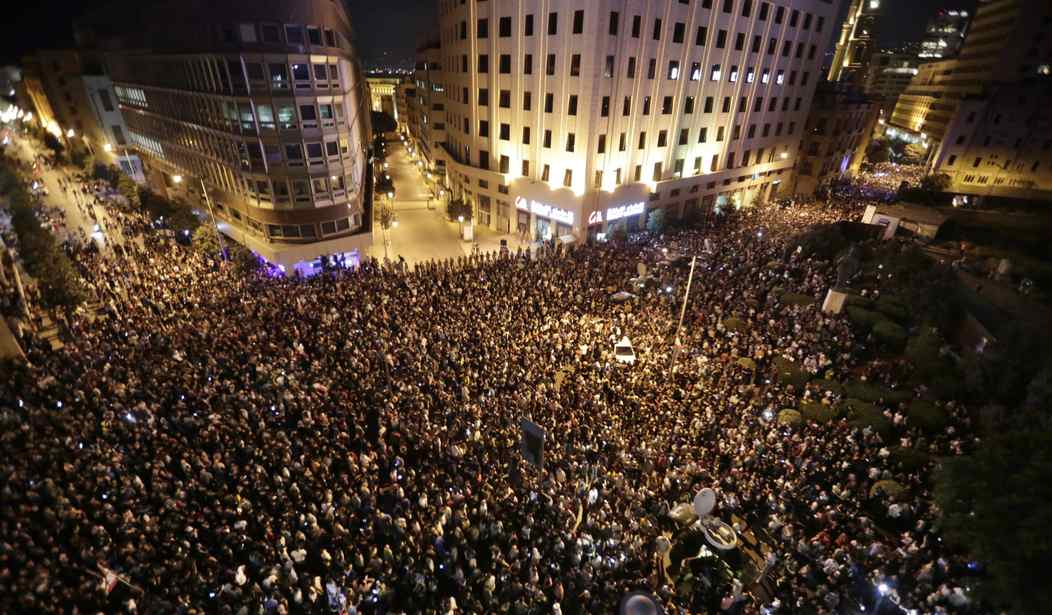Lebanon is experiencing its worst economic crisis in decades, as inflation begins to bite the middle class, the Lebanese pound has lost half its value, and the standard of living has nosedived.
There has been a prolonged political crisis, as the squabbling politicians can’t decide on a new cabinet. Following the resignation in October of Prime Minister Saad Hariri, a political stalemate and paralysis has gripped the government which has been unable — and unwilling — to deal with the economic crisis.
Ordinary Lebanese are blaming everyone, but a particular target of their rage this week has been the nation’s banks.
Nearly 300 banks and ATMs were targeted during demonstrations across the country, according to police. There has been a large number of protests in a busy commercial district of the capital Beirut, which sparked running battles with police for several nights in a row. Some 352 people were arrested during the disturbances, before eventually being released following protests outside police stations.
Lebanon has been paralysed by large-scale demonstrations for three months, driven by anger at the country’s sectarian political class, entrenched corruption and an economic crisis.
The country is one of the most indebted in the world, with a debt-to-GDP ratio of 152 per cent. In the 2016 budget, interest payments accounted for almost half of all government spending.
The economic crisis has deepened in recent weeks as banks have imposed informal capital controls, which have placed restrictions on how much money customers can withdraw. As the value of the Lebanese pound continues to slide, many people are seeing their savings disappear.
With no one in charge, there is little being done to address the crisis. It’s the same old story; banks are in the pockets of the political class and the politicians are getting richer while people’s life savings are disappearing.
Protesters say anger over the actions of the banks during the crisis has been fuelled by a long-held perception that the financial industry has a symbiotic relationship with Lebanon’s political class that has enriched a small, corrupt few, at the expense of the entire country.
“We believe the banks are part of the oligarchy ruling Lebanon. The banks revolve around political figures here,” says 23-year-old Ziad Eldanaf, a philosophy student, at a protest outside Lebanon’s central bank on Thursday evening.
At one time, Lebanon was a prosperous nation and Beirut was known as “The Paris of the Middle East.” But two decades of civil war ended the prosperity and replaced it with sectarian rivalries. The Shias now dominate, largely because Hezbollah is the only armed force in the nation. And they’re better equipped and better trained than the army.
The terrorists dominate because they have the guns and have shown in the past they are willing to use them. Just yesterday, a senior Hezbollah official, Sheikh Ali Daamoush, warned against chaos. People are taking him very seriously.
“We see that it is necessary to form a Cabinet as soon as possible because we know that the crisis which the country and people are suffering from cannot be solved without a Cabinet,” Daamoush said during the Friday prayers sermon.
“Losing the opportunity to form a government now means that the country is headed into chaos, disorder and total collapse,” Daamoush warned.
The anger is also directed against the terrorists who many blame for the political paralysis. Hezbollah is a pariah in much of the western world, making it more difficult for the nation to secure loans and import the goods they need.
But Iran will not allow any loss of influence by Hezbollah in the Lebanese government. Hence, the current stalemate.
Lebanon is on the brink of becoming a failed state — just another sad reminder of the price Middle Easterners are paying for extremism.










Join the conversation as a VIP Member